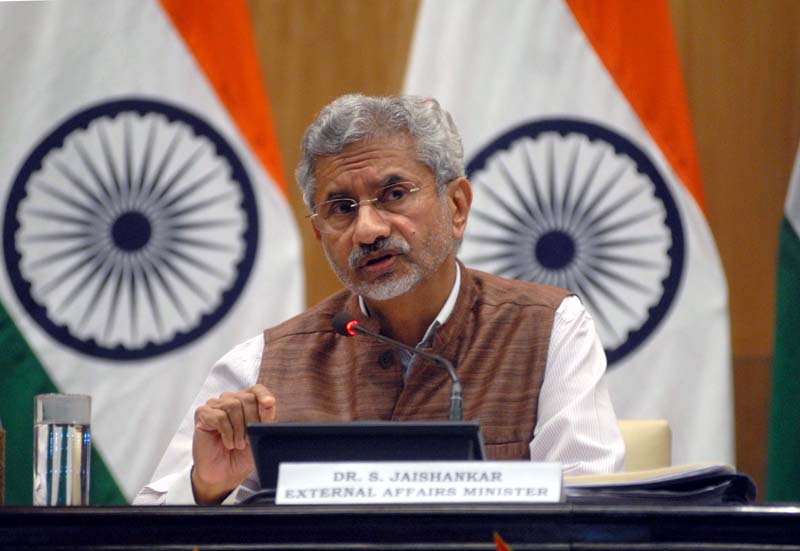
‘Art 370 had become dysfunctional’
NEW DELHI, Sept 17: India today said there is no need to “worry” too much beyond a point about what people will say on Kashmir as it was its internal issue on which its position has “prevailed and will prevail”, remarks that come in the backdrop of raging debate over New Delhi’s decision to abrogate Article 370 from Jammu and Kashmir.
Addressing his first press conference after assuming the office in the Modi 2.0 Government in May, External Affairs Minister S Jaishankar also hit out at Pakistan, saying India has a “unique challenge” from one neighbour and it would remain a challenge until that neighbour becomes a normal neighbour and acts against cross-border terrorism.
He also made it clear that with Pakistan, the issue is not Article 370, the issue is cross-border terrorism and the first thing that has to come to table for any talks with Pakistan has to be the terrorism issue.
Amidst concerns expressed by some countries and the UN human rights organisation over situation in Kashmir, Jaishankar said international audience understands what were India’s reasons for abrogating Article 370.
“It was a temporary provision which is not often used in the analysis of events…The provision had actually become dysfunctional. It was being arbitraged by some narrow set of people for their own gains. By doing so they were impeding development and feeding a sense of separatism. The separatism was being utilised by Pakistan to carry out cross-border terrorism,” he said.
Asserting that India’s position on Kashmir has been clear since 1972 and it is not going to change, he said, “beyond a point, don’t worry too much about what people will say on Kashmir. There is a complete predictability about my position… At the end of the day, it is my issue. On my issue, my position has prevailed and will prevail.”
Last month, the Government abrogated Article 370 from Jammu and Kashmir to withdraw its special status as well as announced bifurcation of the State into two Union Territories –Jammu and Kashmir, and Ladakh. This move was severely criticised by Pakistan with its Prime Minister Imran Khan making highly provocative anti-India rhetoric.
On Khan’s remarks that there is no point talking to India, he said part of the problem with Pakistan is that it has only been talking and not doing anything on terrorism.
“They think nice words are an answer to the real problem. The real problem is the dismantling of this (terror) industry that they have created….Show me a country in the world which will accept that its neighbour can conduct terrorism and then it will go and talk to that neighbour. Our position is completely normal, rational. They are the people whose behaviour is a set of aberration. The abnormality is theirs,” he added.
Asked about remarks by some Union leaders that henceforth talks with Pakistan would be only about Pakistan-occupied-Kashmir (PoK) and not on Kashmir, Jaishankar said, “our position has, is and will always be very clear on PoK, that it is part of India and we expect one day we will have physical jurisdiction over it.”
Talking about performance of the ministry in first 100 days, he said, one of the key achievements of the government in this period has been a strong connection between national security and foreign policy goals.
He also said that India’s ability and appetite to shape the foreign agenda today is much more than before. “In big debates like G20, BRICS, Indian views are now heard more clearly.””
Asked about a possible meeting with his Pakistani counterpart as well as future of SAARC regional grouping, he said, “if and when I meet Pakistani Foreign Minister, we will see at that time what happens”.
But the SAARC is about regional cooperation and that refers to trade, MFN, connectivity etc, he said, adding that now every member knows which country is promoting SAARC and which one is impeding it.
Attacking Pakistan on its human rights track record, he said, “here is a country where minority numbers have gone down so much, I think they have even stopped putting the numbers in public domain. If there is an objective human rights audit of this region, I am pretty confident about which country will come the last.”
There is a growing understanding in the world (about Pakistan) and there is not a single country in the world that would say that cross-border terrorism is not happening, he added.
Jaishankar said the recent incident between Indian and Chinese soldiers on the bank of the Pangong Tso Lake in eastern Ladakh was “not a skirmish” but a face-off which was resolved using bilateral mechanisms in place to defuse such situations.
A scuffle broke out between Indian and Chinese soldiers on the bank of the lake last Wednesday but the matter was swiftly resolved through talks between the two militaries.
The face-off had ended following delegation-level talks between the two sides.
Jaishankar said: “We did not have a skirmish, I want to be very clear I think there was what we call a face-off. It was resolved.”
“From time to time that has happened and it has happened because you have deferring perceptions of the Line of Actual Control (LAC) and patrols meet and some time that kind of situation happens. A lot of effort has gone into mechanisms and procedures to address such situations,” the External Affairs Minister said.
In the recent incident, the mechanisms kicked into play and they addressed the issue as it had been done in the past, Jaishankar said.
India and China share a nearly 4,000-km-long border, major parts of which are disputed. Both the countries are separated by the LAC in the Ladakh region of Jammu and Kashmir. (PTI)

